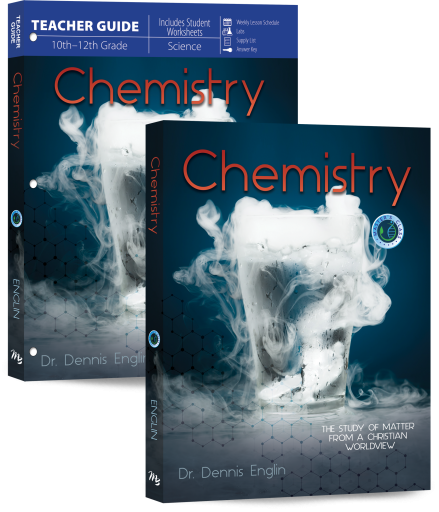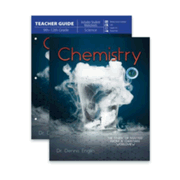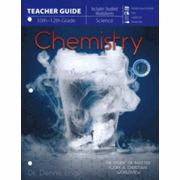Chemistry: The Study of Matter from a Christian Worldview is a comprehensive lab course for students in grades ten through twelve. The course is written from a Christian worldview, and this is evident in the introduction, scattered comments, Bible verses, and an appendix titled “Chronological History of Christian Chemists.” A “Discoveries in Chemistry” feature that appears from time to time throughout the text highlights chemists and their discoveries, although these chemists are not necessarily Christians.
The author, Dr. Dennis Englin, has taught chemistry to homeschoolers for years and has written this course so that it is practical for homeschoolers to use. Students can read the text on their own, but lab work requires supervision.
The course consists of a student textbook and a teacher guide that together present 28 lessons. Each lesson should take a week to complete. An additional eight weeks of review is built into the schedule for a total of 36 weeks.
The 295-page textbook is printed in full-color with a greater percentage of illustrations to text than I typically see in high school chemistry books. Given both the reduced amount of textual information and the fact that eight weeks are dedicated for review, it is clear that the course does not teach as much content as do most other high school chemistry courses. The difference between this and a more in-depth chemistry course shows up, for example, in the chapter on biochemistry. In Chemistry: The Study of Matter, only two topics are taught in the six pages of this chapter: DNA/RNA and carbohydrates—a very limited exploration of biochemistry. In comparison, Holt McDougal Modern Chemistry has about 25 pages on biochemistry covering carbohydrates, lipids, amino acids, proteins, metabolism, nucleic acids, Charles Drew and blood transfusions, and careers in forensic chemistry.
In spite of its brevity, Chemistry: The Study of Matter covers the essential topics well. It does a particularly good job explaining equations and the math used in chemistry. Dr. Englin expects students to have already studied algebra, but he still frequently walks them through the math. Since the math is often a stumbling block for chemistry students, I think many of them will find Dr. Englin's approach very helpful. While the text might not be as challenging as others, it is sufficient for a college prep course and should be significantly less daunting than a course like Modern Chemistry with its 944-page textbook.
The course has 28 labs, one for each lesson, but there is no separate lab manual. Instead, lab instructions with full-color illustrations are in the student text. Pages in the teacher guide repeat the lab instructions and are followed by lab report pages where students will write their hypothesis or purpose, procedures, results, observations, and conclusions. It is unusual to repeat the lab instructions in this way, but don't let it mislead you to think that labs can be done strictly from the teacher guide, Students should work from their text so they have ready access to the illustrations. Students still use the lab report pages from the teacher guide.
Home Science Tools sells a lab kit created especially for this course: the Lab Kit for Master Books Chemistry. The kit includes specialized lab equipment (e.g., test tubes, a glass pipette, Erlenmeyer flask), chemicals, a soil testing kit, molecular model set, a digital multimeter, a spectroscope analysis kit, and other items needed to complete the lab work. A list of required supplies that are not readily available other than from a science supply company is near the front of the teacher guide, and you can gather the items yourself if you prefer.
A single student can do lab work under parental supervision, but I think most students would benefit from working with at least one other student to compare results and, perhaps, share equipment. While lab activities use some scientific equipment and chemicals, the procedures are not very complex and are relatively easy to follow. Supervision is required, but lab activities are safe enough to do at home.
At the front of the teacher guide are brief teaching instructions, a list of required supplies with images (so you can easily see what unfamiliar lab equipment looks like), a sample lab report showing how one should be completed, instructions for quizzes and exams, a grading sheet for recording scores, and a suggested schedule with daily assignments in chart form. The bulk of the teacher guide consists of reproducible worksheets, lab instructions, lab report forms, weekly quizzes, and eight exams. You are given permission to copy these pages for your immediate family or a group class of up to ten students. If you are teaching just one student, you can simply use the pages from the book without copying. An answer key is at the back of the book. Pages in the teacher guide are three-hole punched in case you want to remove them and put them in a binder, but they are not perforated.
There are no questions in the student textbook. Instead, for each week a worksheet has questions based on the chapter material. Some of these worksheets ask for multiple-choice or simple answers, while others require mathematical computations, analysis of the periodic table, or lengthier written responses.
Chemistry: The Study of Matter from a Christian Worldview seems to be one of the most accessible chemistry courses available to homeschoolers that also provides all that is required in a college-prep lab course.













